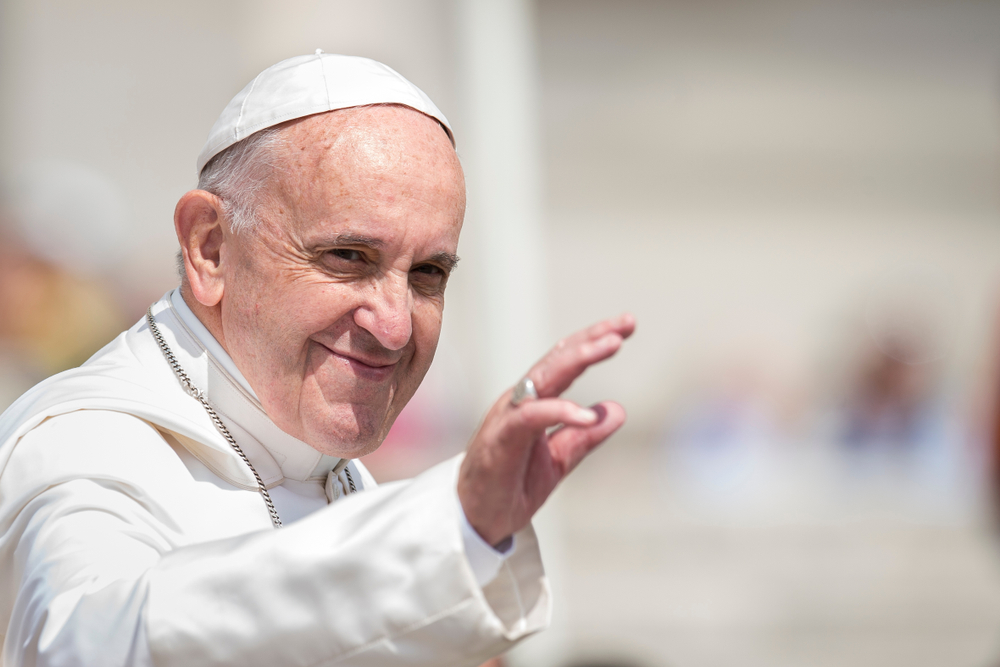(Photo Credits: AM113 from Shutterstock)
VATICAN CITY — Pope Francis, the first Latin American leader of the Roman Catholic Church and one of its most progressive voices in recent history, has died at the age of 88, the Vatican confirmed in a video statement released on Easter Monday, April 21, 2025. His passing follows a recent battle with double pneumonia.
Pope Francis was hospitalized on February 14, 2025, after experiencing bronchitis and a slight fever, which soon developed into a serious case of double pneumonia. Over the following weeks, he endured multiple health setbacks, including kidney issues, anemia, and steroid-induced diabetes. By February 21, doctors declared him in critical but not imminently life-threatening condition. He faced respiratory crises requiring assisted breathing and multiple procedures to clear his lungs. On March 10, doctors said he was no longer in imminent danger, and by March 12, X-rays confirmed improvement. The Vatican released the first photo of his recovery on March 16, and on March 23, after five weeks of treatment, Pope Francis was discharged and returned to the Vatican to continue his convalescence.
The Argentine-born pontiff, born Jorge Mario Bergoglio, made history in 2013 when he became the first Jesuit pope and the first pope from the Americas. But beyond his background, it was his compassionate, at times controversial, approach to social issues — particularly his unprecedented tone on LGBTQ+ inclusion — that defined much of his papacy.
In July 2013, just months into his role, Pope Francis uttered what would become one of the most quoted lines of his papacy. Speaking to journalists on a flight back from Brazil, he said:
“If a person is gay and seeks God and has good will, who am I to judge him?”
This statement marked a sharp departure from the traditional rhetoric of the Church, sparking both praise and criticism. LGBTQ+ Catholics and allies saw it as a glimmer of long-hoped-for acceptance, while conservative factions within the Church viewed it as a risky softening of doctrine.
Later, in an October 2020 documentary titled Francesco, Pope Francis made headlines again for advocating legal protections for same-sex couples: “Homosexual people have a right to be in a family. They are children of God and have a right to a family. Nobody should be thrown out or be made miserable over it,” he said. “What we have to create is a civil union law. That way they are legally covered.”
Although he never changed the Church’s official stance on same-sex marriage or the celibacy of priests, Pope Francis repeatedly called for mercy, inclusion, and dialogue over condemnation.
Throughout his papacy, Pope Francis emphasized the dignity of all people, often choosing compassion over dogma. His comments and pastoral tone helped many LGBTQ+ Catholics feel more seen within a Church that has often rejected them.
As the world mourns a spiritual leader who challenged centuries of tradition with humility and heart, LGBTQ+ Catholics remember a pope who — though imperfect — dared to open doors.
Rest in peace, Pope Francis!
This was goodbye
— Catholic Arena (@CatholicArena) April 21, 2025
Pope Francis rode through St. Peter's Square on the Popemobile yesterday despite being gravely ill pic.twitter.com/7Qwy7FEUMh
The Bells toll in St. Peter's Square marking the death of Pope Francis pic.twitter.com/TZ9IRIqtE7
— Catholic Sat (@CatholicSat) April 21, 2025
Pope Francis died on Easter Monday, April 21, 2025, at the age of 88 at his residence in the Vatican's Casa Santa Marta. pic.twitter.com/jUIkbplVi2
— Vatican News (@VaticanNews) April 21, 2025










Compassion for the Ts and Qs but not for the countless victims of priests
That’s pretty much like that in every church no matter the religion. A lot of these so-called priests that usually dubbed themselves as the “Sons of God” would condemn you for being homosexual, telling you that you’re paving your way to hell if you don’t change your depraved immoral ways. But then they turn around and ignore their own teachings by SA’ing little boys in the congregations and attending gay parties or outings in secret. Then have the audacity to act all holy and thou during Sunday meetings as if they didn’t just touch your children or participated in the… Read more »
Oh man oh man. I soooo pray for you friend. You said a mouth full and I commend you for being honest. Don’t let anyone tear you down. You are strong and always stay that way. Live by your convictions and GOD will reward you! Love joy & peace are the greatest of all. Be Blessed
Was his recognition and support of Homosexuals from his innate feelings or was it the innate knowledge that Homosexuality is as much of Organized, Roman Catholicism? Perhaps, the writing was on the wall and reality forced him to notice?
You’re asking whether the institution that chastised Galileo for presenting evidence for heliocentrism may try to appear culturally relevant, or at least something other than an archaic, useless, bunch of men in dresses who hoard vast amounts of wealth and art? Hint: the answer is ‘yes”.
Until the church supports gay people having the full panoply which is only afforded to them by full marriage, it can fuck right off.
The fact that a post advocating for the Church wanting the same rights for ALL couples gets DOWNVOTES on a GAY HOOKUP SITE is yet one more sign of the rampant repression and boomerism of the people in the comments section. It’s kind of gross. Do better.
Perhaps people were reacting to your attitude and not the message. The fact you would end this with an insufferable ‘do better’ says a lot.
That I stand up for equal rights when they’re under fire says a lot? Yeah. I know. And the fact that you continue to think internalized homophobia and downvoting equal rights FOR EVERYONE says even more. I said it again, and I’ll say it again. Do better.
Watch “The Shack” on Netflix.
I consider myself an open- minded individual. My go- to news channel is CNN. Why is all they talking about today is Pope Francis? I mourn his death like any other death. Catholics, I pray for you all, and hope you all find strength. My concern also is world peace, inflation, job security, mortgage rates, tariffs, etc. A lot of Americans are living from paycheck to paycheck with little or no savings. We got a racist, twice impeached President in the white house with a dam- near all white cabinet. Citizens of all political parties protesting on the streets for… Read more »
You don’t have people “of all political parties” protesting Trump. The vast, VAST majority of Republicans still openly support that shitgibbon and would happily vote for him again if they could. And the way things are looking, they’ll be able to do exactly that when he runs for a third term in 2028.
People from all political parties are indeed protesting Trump. They raising holy hell at town hall meeting, republicans as well. I agree, a lot of die-hard Trumpians are still with him. I hope he can’t run in 2028. I had enough of his sorry azz.
That you know two people down the street who are Republicans who happen to be protesting Trump isn’t evidence that “people of all political parties” are protesting him. The VAST, VAST majority are Democrats or third-party voters who care about the preservation of democratic institutions – which the kowtowing, ballsucking Republican Party stopped caring about as soon as they nominated a shiftless, pathologically lying con man, adjudicated rapist, conspiracy theory, and fraudster in 2016.
True, but you then must recognize that not all Democrats are joining the protests.
If my “go to” news source was CNN which is nothing but propaganda for the DNC I’d think we have a racist president too
Lol you lost me at go to news CNN lol.Thats a joke. Then you accuse others of racism while you white people. Ooooooh the woketards
CNN is a joke haha. Referring to someone as racist while you white people is just hypocritical racism. WTH. Woke people are soooo damn asleep. Ironic !!!
My comments where edited by the censor police.
CNN was my Go-to news network until it took a hard Left turn and could no longer broadcast news without a Blue spin. It became the network of hate and division.
Other media outlets have their positions as well, many able to generally report facts without hidden opinions and positions . I’m sure to listen to varios ones throughout each day to gain broader understandings of the actual stories.
Open-minded people do not listen solely to CNN.
I don’t have to explain anything to you or anyone else, but when I say, CNN is my go- to news outlet I mean like if, heaven forbid we have a school shooting or severe weather forecast, I go to CNN for full coverage. I watch ABC, CBS, NBC news as well as some cable news shows. I never mentioned the word SOLELY!!!
Live and let live; love and be loved. Anything else, God will judge, damn or forgive! Simple.
You have no evidence that god can so much as give me a hangnail, let alone damn me or forgive me for anything I’ve ever done.
Watch a movie “The Shack” on Netflix.
.,.
Some Christians believe God is their judge and He’ll decide if they end up in Heaven or Hell, issuing his wrath and punishment on them if needed. They also believe he gives people cancer or let’s them be subjected to abuse and natural disasters, that whole “God doesn’t give anyone more than they can handle” thing. And also that “Why does God ‘let’ bad things happen to good people?” thing. Other Christians believe God loves every one. Through “free will” He gives people the power to decide between good, bad, and evil. And people send themselves to Heaven or Hell… Read more »
Until the church supports gay people having the full panoply of rights which is only afforded to them by full marriage, it can fuck right off.
Watch a movie “The Shack” on Netflix.
Waiting 7 hours now to get my comments approved. Didn’t think it was all that controversial
It’s a regular thing now. I doubt they even have a person manning the comments section. It’s likely all AI-automated now.
Yes. They get time off. Sometimes weekends. Most nights. Everything most workers wish … as you might.
He was definitely most liberal Pope ever. It’ll be interesting to see if they go another direction or vote for another left wing Pope